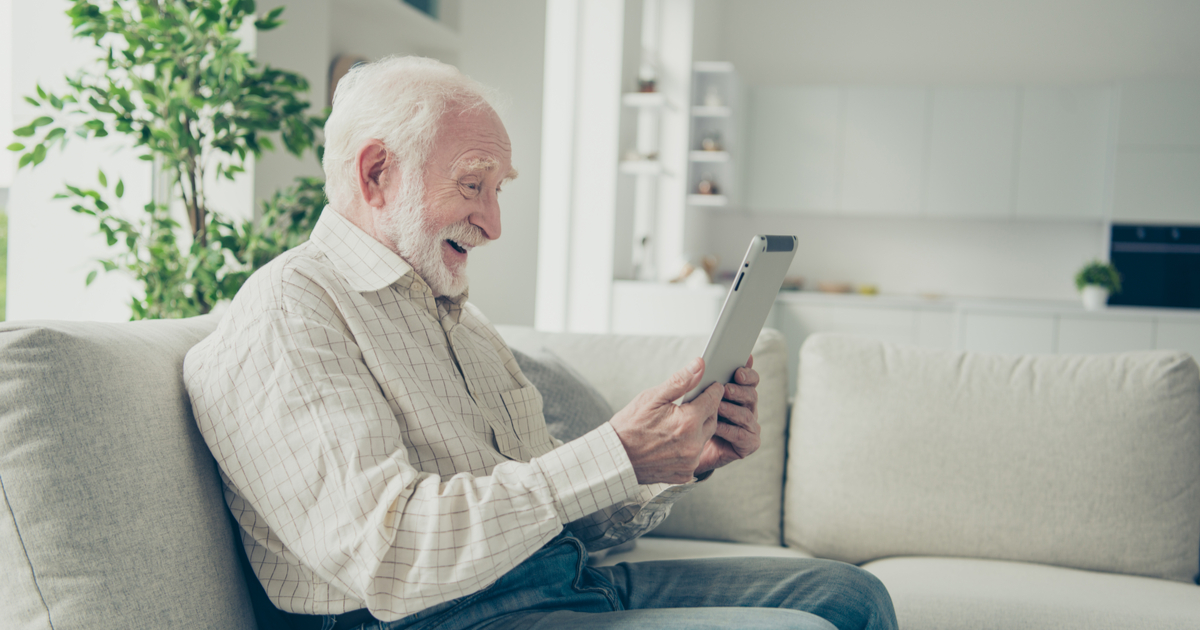A benign long-term consequence of the COVID-19 outbreak is the introduction of an entirely new slew of words into the American vocabulary. For example, most people were unfamiliar with the expression, “flattening the curve,” only a couple of months ago. But the new language of coronavirus has also created areas of confusion that can lead to negative outcomes. One of these is assuming “social distancing” is synonymous to “social isolating.”
It’s true that medical experts recommend forms of physical isolation for seniors and other groups at high-risk for COVID-19 contraction and complications. However, they are not advocating for social isolation. The latter practice is unhealthy for all people and can present a host of risks all its own!
Here are ways people can help seniors social distance without social isolating.
Schedule Regular Video-Call Visits
Video communication isn’t the same as in-person meetings, but it’s still more personal than standard phone calls. People are visual creatures, and we connect with loved ones and friends partially by seeing their familiar faces, expressions and body language. Also, tone can sometimes be hard to gauge during an audio-only call. People are more likely to misinterpret communications, which can create unnecessary conflict and strain relationships. Managing the COVID-19 is difficult enough, so anything that can be done to mitigate the stress should be embraced!
Fortunately the vast majority of Americans now have access to video call technology free of charge. Most mobile phone plans include unlimited data, and popular communication smartphone apps can be downloaded at no-cost via Google Play and the App Store!
Have “Virtual Dinners” Together
Many traditional activities are being conducted virtually these days. Large groups of people are even celebrating birthdays and weddings through Zoom and similar video communication platforms. So, why should a family dinner be any different?
Younger family members and friends can schedule food delivery for their older loved ones and then join them in “virtual dinner.” Even though each party is living in a separate residence, they can coordinate their menu to ensure everyone is eating the same dishes. Then, everyone can connect through video for real-time discussion and interaction. Some seniors will find the activity really creates a genuine connection that helps to combat feelings of isolation and loneliness.
Start a New “Movie Night” Tradition
Many seniors enjoy a variety of activities, but some lack the energy to initiate them on their own. Younger friends and relatives might therefore take the initiative to schedule group “movie nights.” As with dinner, everything can be coordinated remotely with widely-available tools. And the events will likely prove both entertaining and socially engaging for otherwise lonely folks.
A movie on television can be watched by all parties simultaneously. Or, younger participants can provide a no-contact DVD drop to the quarantined senior. More ambitious and tech-savvy folks may even find a way to bring streaming services into the home of an older person who is unfamiliar with the technology.
Whatever the entertainment medium, the parties can coordinate a video call to communicate throughout the movie. The intended effect is to create the perception that everyone is watching it together in the same room.
Share Positive News Updates
Unfortunately, much of today’s news is very negative. COVID-19 is understandably dominating the headlines, but all people need an occasional break form the “doom and gloom.” Younger family members can help bring some cheer to isolated seniors by sharing positive online stories. While network television typically focuses on the “big” stories, internet searches can produce a broader spectrum of more obscure news.
Younger people appreciate funny memes and cat video shares. So why can’t older relatives have a laugh too? They may not be active on social media, but there’s no reason they can’t view videos and news links via text and email. And even if “Grandma” isn’t a fan of goofy viral videos, she may appreciate a travel, food or other special-interest web link.
Purchase Books or E-Books and Coordinate Delivery
As previously mentioned, older folks sometimes don’t utilize resources younger people take for granted. Aging relatives may not be familiar with Kindles and e-readers. And the idea of ordering books on Amazon may be as foreign to them as landing a spaceship on the surface of Mars! Younger family members can really make a difference in the lives of isolated seniors simply by securing these resources on their behalf.
Even if an older relative isn’t comfortable operating a tablet or e-reader device, she’s certainly familiar with traditional books. Therefore, family can also order physical books and schedule Amazon delivery to her doorstep. Podcast subscriptions may also prove great gifts for seniors with specific interests such as politics, history and travel.
Conclusion
At the end of the day, most Americans have faced challenges in light of COVID-19. And while all people have had to adjust their daily lives, older folks have suffered a disproportionate impact. Not only are they at greater risk for infection and resulting medical complications, but they’re also being advised to self-quarantine. Younger family members must work hard to ensure their aging loved ones social distance without social isolating!
As a fully licensed and insured home care agency, our highly trained, compassionate caregivers are ready to step in when you need us. We’re happy to serve as an extended family in your senior’s home so they can safely continue receiving the care they need and avoid social isolation.
Our in-home services include companionship care, personal care, live-in care and 24-hour care to name a few. To learn more now about Adultcare Assistance Homecare, or to schedule a FREE in-home consultation with a case manager today for a senior in Sun City, Tucson & Phoenix, Arizona, please visit: www.adultcareassistance.com!





